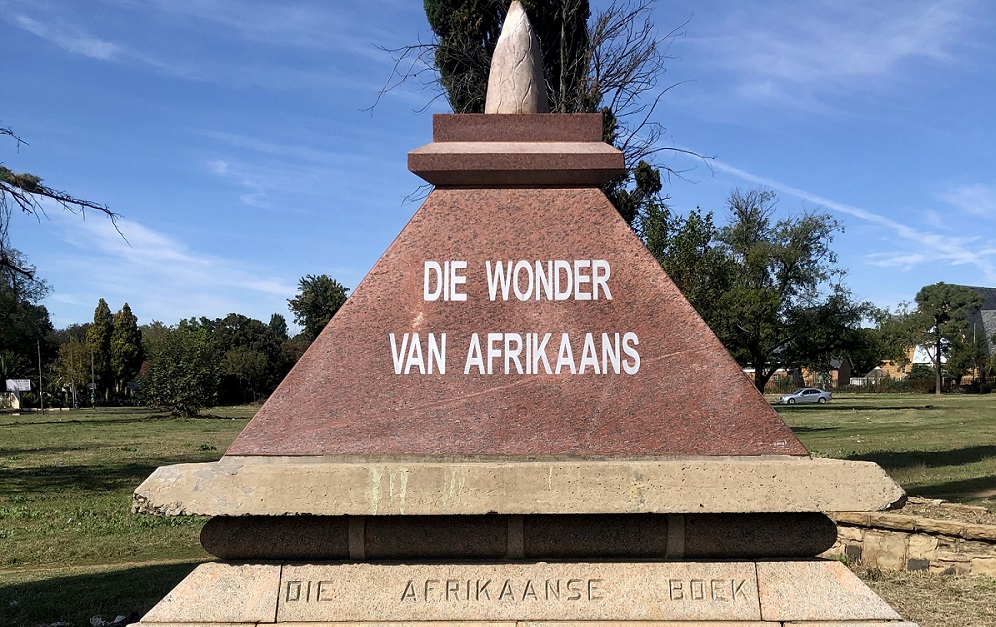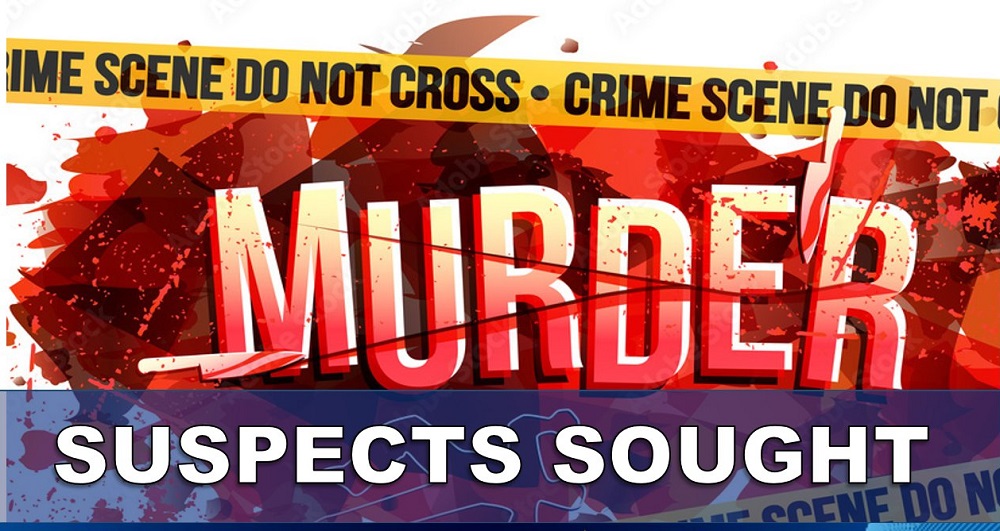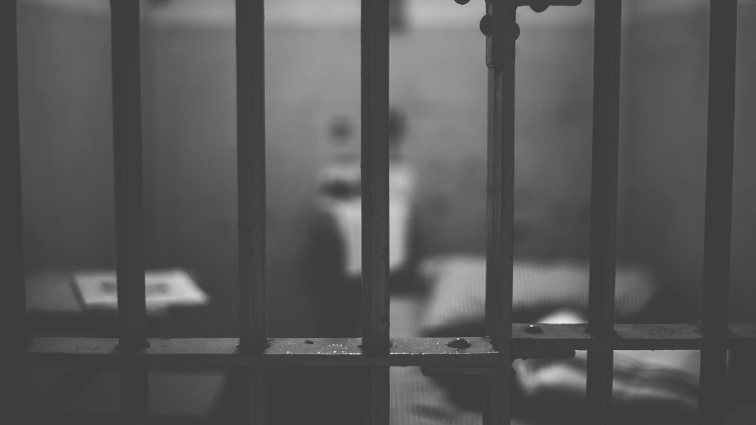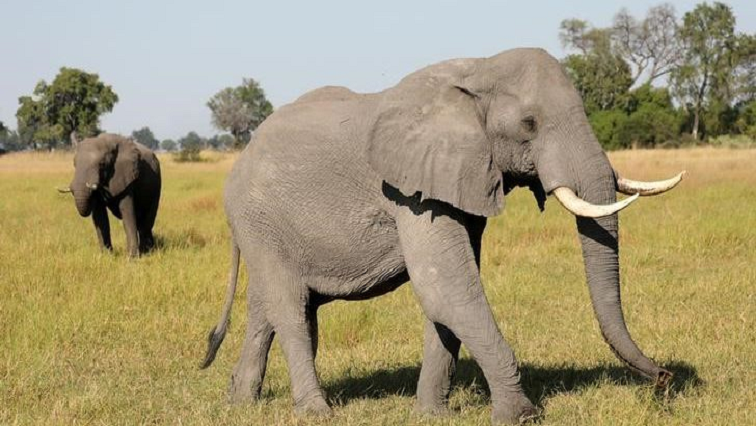-
Afrikaans monument in Welkom
On 8 May 1925 Afrikaans was recognised as an official language of South Africa.
But like many things that develop naturally and organically, the birth of Afrikaans cannot be traced back to a specific date and person. You’ll find early spouts at the southern tip of Africa where a cauldron of languages and a medley of cultural influences slowly but surely stirred and simmered until a unique African language, Afrikaans, emerged.
According to Census 2011, I am part of the 12.7% Afrikaans home language speakers in Gauteng. But truth be told I would have been part of the 53.8% speakers in the Northern Cape, because I am one of the thousands of children of the Northern Cape soil that had to migrate from the uitgestrekte vlaktes (vast plains) of the biggest province in the country with the smallest population for job opportunities.
After a shortleft in the Free State I landed in Gauteng where according to the census, Afrikaans is still the 3rd most spoken language, but alas only 12.4% of the population reporting it as their home language.
My problem is when I walk pass a coloured or mixed-race person (whatever tickles your fancy), or a white person my brain switch to Afrikaans and I want to converse in my mother language (wat ek met moedersmelk ingekry het).
In the area where I stay, I’m mostly greeted back in Afrikaans and you instantly recognise the comfortability and ease the language roll off the tongue, but soon most switch to English. Some embarrassment creeping into their eyes and the little downward turn of the lips verraai die verraaier (betray the traitor). Then we sukkel (struggle) on in English and I can’t really settle in with the conversation. Not because I can’t speak English, but because I feel at some level, they have sold their birthright for a pot of lentil soup…. A narrative that Afrikaans is not our language.
Nonsense, twak! That is when people want to sell you peredrolle vir vye. Literally this means you are selling the horse dung for figs. You want to sell me something that stinks coated in your twisted truth or is it perception?
I was born in 1976. Yes, the year of the Soweto uprising against the forced introduction of Afrikaans as language of learning in schools.
I grew up for the first 11 years of my life in Danielskuil in die Groen Kalahari, in the heart of the Northern Cape. The only language I would hear falling on my ear was Afrikaans. Even by my Tswana grandmother, who never spoke her language with us. I’ll always regret this, but in hindsight (perfect vision) I do understand. She was thinking of her now coloured children (married to a Baster) at a time when being white, or a darker shade of white, was seen as better than black, you don’t have to carry a dompass. And even speaking Afrikaans, my goodness, you are A for away.
It didn’t even register to me that there was something like Mother Tongue Language or another language. The sounds I heard on our black and white small TV coming from the MacGyvers and Michael Knights didn’t even strike me as a language.
It was only in Standard 3, the modern-day Grade 5 that a teacher was brave enough to attempt to teach these plaasjappies (farm dwellers) “I am, she is, they are…” And poor Miss Human struggled with us in Standard 7 through An Accident on Rocky Path in an attempt to get us to high school. I must also attribute my love for reading to this dear white Afrikaner women, who never gave up on teaching us English.
When we moved to Jan Kempdorp, also in the Northen Cape, but with Grens Street running through the town, separating it with North West province, I ontdek (discover) the local library. This boere-gemeenskap (farm community) of the Vaalharts Besproeiïngskema has really made the coloured people comfortable. Separate development, but decent. Dé vat, en hou julle bekke, soort van ding (There, take, and keep your mouths shut, kind of thing), now that I look back and try to make sense of it all. Neatly build municipal houses, tarred roads (even if it was only Protea, Lelie and Jacaranda streets where the white teachers had to drive to get to our school) a very beautiful, state of the art swimming pool and then my favourite, the library.
I started with the Saartjie-series and then Trompie, just not to be sexist. By the age of 12 I’ve already verslind (devoured) Ena Murray, Dalene Matthee and Konsalik (translated). By the age of 15 my beloved librarian Desiree was already keeping all the new books for me under the counter. It was only placed on the shelves after I’ve returned it…… with reviews: good or bad. At one stage I had collected 13 library cards from all friends and family to have enough books for the two weeks we were allowed to keep it.
I must confess, I only read Afrikaans books at that stage. It was mostly love stories of people on farms, but it was in Afrikaans. It was effortless, it made sense to my brain and my psych. I understood it on a level that I can’t explain.
I had excelled in Afrikaans at school. By the time I was in Standard 8 my Afrikaans teacher, Miss Pienaar would return my essays without any corrections, not even a comma out of place. That would assure me of an A in Matric.
What would I study? No brainer, something with language. I got accepted at the University of the Free State (Kovsies) for BA Communication. I would complete this degree in Afrikaans… all my subjects, Political Science (Prof. Andre Duvenhage and Roy Jankielson were some of the lectures that taught me political terms in Afrikaans), Psychology, Business Psychology and the compulsory language? Afrikaans Nederlands, this still baffles my English-speaking kids. Not just plain Afrikaans: Afrikaans Nederlands!
My first real job was as a translator for Hansard at the Free State Legislature. Still in the days of Ouma Winnie Direko as Premier. How easy it was to translate from English to Afrikaans, but the reverse…. That took some time.
That carved my path to work in the Afrikaans field. My husband sometimes asks me if I never regretted cementing myself in this stream…. Then I sit behind my desk, and I get stories from different regions with Afrikaans upsounds. I hear the plea of ordinary South Africans for service delivery…. In Afrikaans. I hear how a mother cry for her child who died because a stray bullet hit her child…. In Afrikaans. I hear Dr. John Hlope speaks after the MK-trial…. in Afrikaans. I hear politicians getting their points across in Parliament… in Afrikaans. I UNDERSTAND your plea, I HEAR your cry, you have spoken to my heart.
As I said, I’ve been born in 1976. What happened in Soweto, Langa, Nyanga en townships around the country has always been part of who I am. As soon as I became politically aware round about 1989/1990 at the age of about 14/15 I was devastated that anyone could lose their life because of my beloved language. How could my language be abused by a system, by politicians, by those who claim the language belongs to them? Those who fought at the turn of the 1900 for a rightful place for Afrikaans alongside English of the Oppressor the British and Dutch the language of the forefathers, had now oppressed others: Afrikaans will be the language of teaching.
The language was now an adult, middle aged. It just turned 50, or so they claimed.
Afrikaans was wrapped in a dark cloud of whiteness and oppression. It was met with resistance by black and some coloured people. Those who spoke it or not, would even be seen as those for or against the resistance movement. Afrikaans coloured people will bring up their children in English and plough through conversations with other Mother tongue Afrikaans speakers, just not to be heard speaking the language of the Afrikaner, the oppressor.
But now it has aged… Its 100, so they say, and now no one is afraid to claim their stake: the language belongs to everyone who wants to speak it. It belongs to South Africa; it is an African language. It is a vernacular language, indigenous.
I’m proud to read the books of E.K.M. Dido, the first black person to publish a novel in Afrikaans and from my generation Bettina Wyngaard.
As Hein Willemse concluded in his commentary Black Afrikaans Writers: continuities and discontinuities into the early 21st century, “Lately, writers, theatre producers and activists influenced by contemporary hip-hop culture have claimed Afrikaans, and particularly Kaaps, as their language of authencity and social resistance.”
Afrikaans is my language. As someone once said “Die witmense by Stellenbosch het net gekom en die kommas en punte aangesit en nou noem hulle dit hul taal!” (The white people at Stellenbosch came and put commas and full stops and now they call it their language!)
I raise a glass on Afrikaans and all who speak it! Would love to see how it looks in another 100 years: rich, bold, diverse with so many layers.
Daniëlle Wass is Bulletin Editor: SABC TV NUUS. She writes in her personal capacity.





